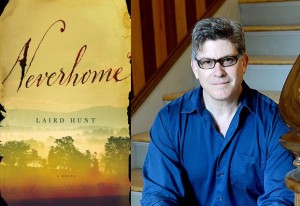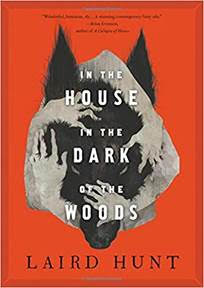Anisfield-Wolf winning novelist Laird Hunt capped his book tour for the newly-released “Neverhome” by returning to Cleveland this week, arriving directly from Toronto with big news: the Dublin-based Element Pictures has acquired rights to his new novel and signed Lenny Abrahamson to direct.
Hunt, 46, had just met with Abrahamson in Canada, where the director is set to film Emma Donaghue’s suspenseful bestseller “Room.” Hunt told his Cleveland audience, gathered in the Beachwood branch of the Cuyahoga County Public Library, that he and the Irish director hit it off and are excited about bringing “Neverhome” to film.
It tells the story of Ash Thompson, formerly Constance Thompson, who leaves her Indiana farm disguised as a Union soldier to join the Civil War. Hunt said hundreds of women, both in the North and South, took up arms – some for love, some for money, some for adventure. If they were discovered, they were often accused of spying or insanity and drummed out, only to walk down the road and join another regimen. “One of the women did this seven times,” he said.
A warm audience greeted Hunt in Beachwood with a close reading of the text. “It is such a pleasure to be back in this room,” he said. “I associate it with one of the happiest weeks of my life.” A year ago Hunt accepted his Anisfield-Wolf award for “Kind One,” a mediation on revenge and slavery set on an antebellum Kentucky pig farm.
The new novel, like “Kind One,” springs organically from its opening sentence: “I was strong and he was not so it was me went to war to defend the Republic.” Hunt said he wrote the book in a blistering three weeks from the spark of that sentence, and then spent two-and-a-half years refining it. He worked to stay true to the “understated fierceness” of that single narrative voice, and to pay attention to the ways voice can conceal and reveal gender.
Asked why the reader has no solid sense of the physical Ash Thompson, Hunt observed that the Civil War was fought largely by boys, whose character was still indistinct, especially in photographs. And he mentioned David Hodges’ essay on the dilemma of historical fiction – no character says: “Now I will put on my hobnailed boots.”
And although Hunt’s scholarship ran deep and wide, he wanted the voice of the opening sentence to be the reader’s gateway – not photographs, not military maneuvers, not all the accumulated frames readers keep at hand for this war. The voice itself is a hybrid, he notes, “not exactly a 19th-century voice, but informed by it.”
And, if Element Pictures executives have their way, one day soon readers will hear it in an actor’s mouth.


